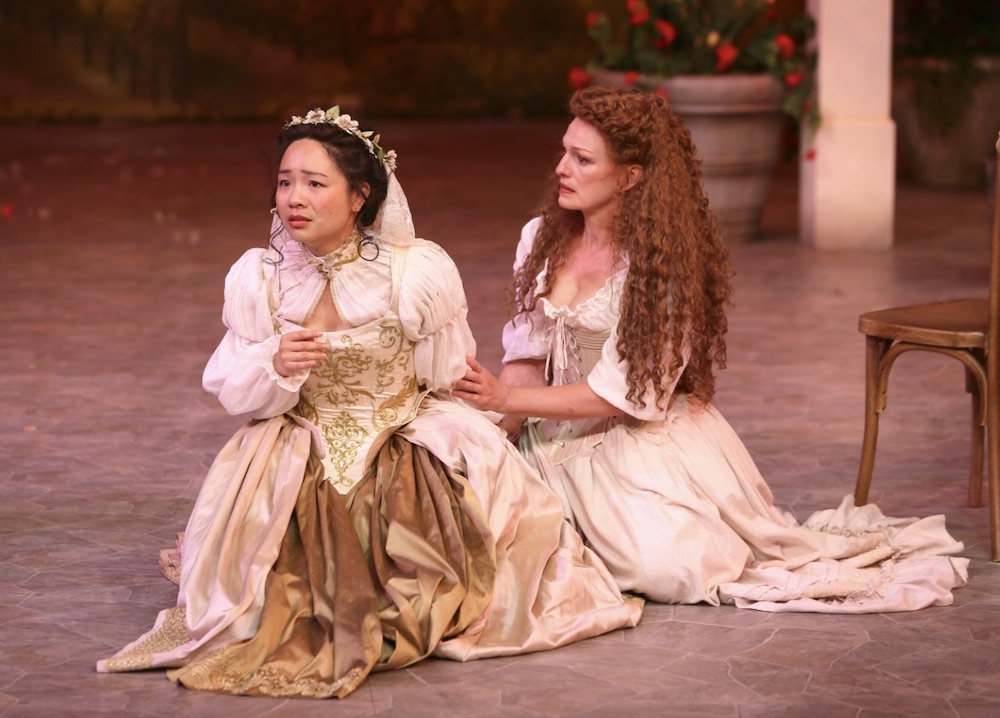This Bard on the Beach production of Much Ado About Nothing explains ideas that don’t need explaining and misses ideas that should be obvious.
The script is about the cruelty of patriarchal gender dynamics. In the central story, Beatrice and Benedick, who are clearly made for each other, both declare that they will never marry, and choose to sublimate their clear mutual attraction in exchanges of barbed wit.
Why would they construct such impenetrable armour around their tender feelings? Look no further than the treatment of Beatrice’s cousin Hero.
Hero is besotted with the young soldier Claudio, but a spiteful plot cooked up by the bitter Don John frames her as a wanton, who has had sex with a “ruffian” the night before her wedding. At the altar, Claudio viciously rejects Hero and publicly shames her. Her father Leonato’s first impulse is to disown his daughter. Hero’s virginity was her currency; that gone, supposedly, she is thrown on the trash heap by the most powerful men in their town, Messina.
Through the intervention of Beatrice and Benedick, and a comic band of bumbling officers, who root out injustice more quickly than their supposed betters, the truth is revealed, and Claudio is forced to marry Hero. But, in Shakespeare’s original, this is a tragic resolution of the subplot: privileged men have arranged it all — and maintained their power. Hero has zero agency and she’s trapped in a marriage that will likely be unhappy.
Dangerous gender dynamics are an important part of the context of the play: they’re what make Beatrice and Benedick proceed so cautiously.
And Beatrice addresses this toxicity directly. She rages against her powerlessness. After the betrayal but before the resolution, when she is desperate to exact revenge on Claudio, she fumes, “Oh God, that I were a man! I would eat his heart in the marketplace.” But, she acknowledges, “I cannot be a man with wishing, therefore I will die a woman with grieving.”
The proto-feminism of Much Ado About Nothing should be obvious, which is why I find it so annoying that director Johnna Wright has chosen a version of the script that has been unnecessarily “improved” by playwright Erin Shields. Shields has inserted a prologue. Delivered by Beatrice, this prologue explains that Hero is prized for her beauty to the point of “blatant vanity”, and caught in an endless performance of innocence, which she finds “exhausting.” Sure. Maybe. Kind of. But, if that’s your take, why explain it? Why spoonfeed us? Why not let us discover it? Does Shields think we’re so thick, does Wright think we’re so thick, does Bard on the Beach think we’re so thick that we need be led to the understanding that the patriarchy disadvantages Messina’s women, including Hero? Do they think we’re incapable of understanding that is the point?
Shields has also included a long scene that more comfortably ties up the admittedly uncomfortable resolution to Hero’s story. In Shields’s reframing, Hero has been reborn after being jilted at the altar. Reemerging as a new woman — essentially, a new character — on her second wedding day, Shields’s Hero excoriates her father for his initial, but short-lived, impulse to disown her. Then she tests Claudio. Hero rejects the imposition on women of a “mask of virtue” and asks her betrothed what his response would be if she were — by her own consent — no longer a virgin? Claudio declares that he is not worthy of Hero’s love and begs her to let him love her anyway.
This new passage is a lazy form of political correctness. It’s a shortcut, a copout, an easy way of giving contemporary audiences what Shields thinks they need to hear to make them happy. It’s a reductive form of feminism that fails to recognize the proto-feminism of Shakespeare’s script, or the reality of the world of Messina that Shakespeare has created and which he is critiquing in terms that remain wholly relevant. I remember seeing, a hundred years ago, a Playhouse production of Much Ado that was directed by Larry Lillo. Corinne Koslo played Hero and her submission, her entrapment, in marrying a still-hostile Claudio wrecked me — and played a significant role in unlocking the riches of the script. In terms of feminist analysis, I found the complexity of that reading far more satisfying than Shields’s papered-over fairytale.
This textual wrongheadedness is emblematic of the fundamental failure of this production. (It does have strengths, which I’ll get to in a bit but, in my opinion, the overall tone is substantially off.) While Shields’s rewrite focuses on the reframing of Hero’s subplot in simplistic feminist terms, Wright’s production largely ignores the gender-charged tension that runs throughout the tale, including in Beatrice and Benedick’s central storyline. Wright’s interpretation replaces the wary, complicated nature of their verbal sparring with loud, uncomplicated, freewheeling banter, so the richness of the core dynamic is lost.
Jennifer Lines (Beatrice) is more successful in negotiating the director’s terms than Sheldon Elter is as Benedick. In the early going, Lines’s Beatrice comes across as brassy and superficial, but she is, nonetheless, inhabiting a fundamentally credible, reasonably naturalistic world. Under Wright’s direction, on the other hand, Elter goes into full-blown clown mode, mugging and posturing as Benedick, performing Much Ado as if it were a crude farce, which it is not. So the wit is lost. The potential credibility of Beatrice’s attraction to Benedick is lost.
For too long in this mounting, there’s too little tension and nothing really matters.
That changes notably, albeit sporadically, when Hero is betrayed. Lines’s full embodiment of her character, which has been consistent throughout, slips into an emotionally deeper groove: her grief and fury over Hero’s betrayal are moving.
But there’s still a price to be paid. In that grief and fury, Beatrice exhorts Benedick, “Kill Claudio.” The force of that line should be bone-chilling. But, because of the flippant tone that has been established, it provoked a huge laugh the night was there.
Playing Hero, Jennifer Tong delivers her lines ably, which is no mean feat, but, because the Shields/Wright interpretation is hellbent on obviating the doomed vulnerability of Hero’s innocence, I felt little emotional investment in the character.
Angus Yam (Claudio) is also an able actor, but I think he’s miscast. To his great credit, Yam makes sense of the language. He has an easy, confident charm. And I was moved by the grief he accesses in the rewritten ending. But a key to understanding Claudio is that he’s a soldier, snared in a particularly rigid form of masculinity that causes him a kind of pain that’s incomprehensible — and therefore infuriating — to him. In Yam’s interpretation, I missed that masculine entrapment.
Matthew Ip Shaw’s performance as Don Pedro, the most high-status man in Messina, is right on the money: kind, compassionate, mistaken, lonely.
And Scott Bellis is excellent as Dogberry, mining all the comic potential of the ridiculous master of the watch.
I found Pam Johnson’s set, full of arches and festooned with artificial flowers, overly light and decorative, but that’s in line with director Wright’s vision.
On that set, I wish that Wright had found more variety in her blocking: she has placed almost the entire production squarely centre stage.
Mostly, though, I wish that this production had more faith in the complexity of the script and in the ability of Bard’s audience to grasp it. The more Bard continues to produce dumbed-down interpretations of Shakespeare’s texts — and that’s the dominant mode of Bard on the Beach these days — the more that capacity will be diminished. That is a serious disservice.
MUCH ADO ABOUT NOTHING by William Shakespeare. With additional text by Erin Shields. Directed by Johnna Wright. This Bard on the Beach production is running in rep in the BMO Mainstage tent until September 20. (Tickets and information)
PHOTO CREDIT: Hero is betrayed and, well into its second half, this production finally kicks in — sort of. (This photo of Jennifer Tong as Hero and Jennifer Lines as Beatrice is by Tim Matheson. The costumes are by Mara Gottler.)
BUT WAIT! THERE’S MORE! You can get all my current reviews PLUS curated local, national, and international arts coverage in your inbox FREE every week if you subscribe to Fresh Sheet, the Newsletter. Just click that link. (Unsubscribe at any time. Super easy. No hard feelings.) Check it out.






0 Comments